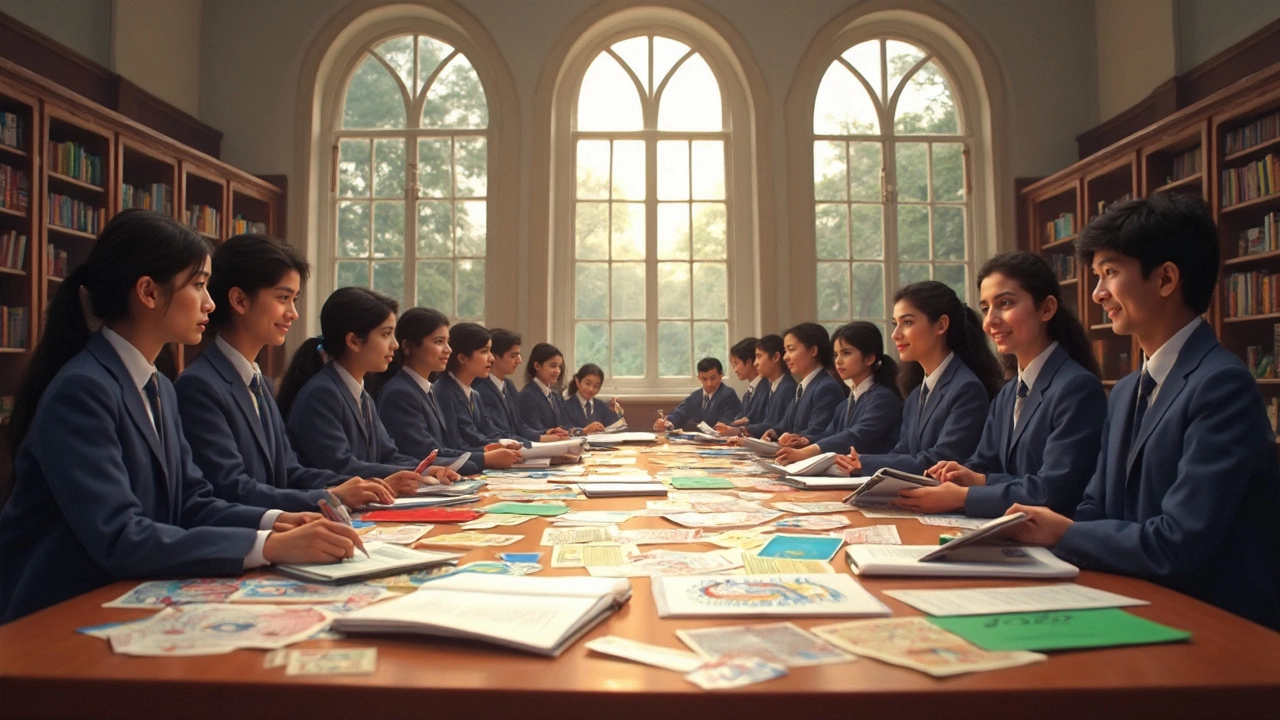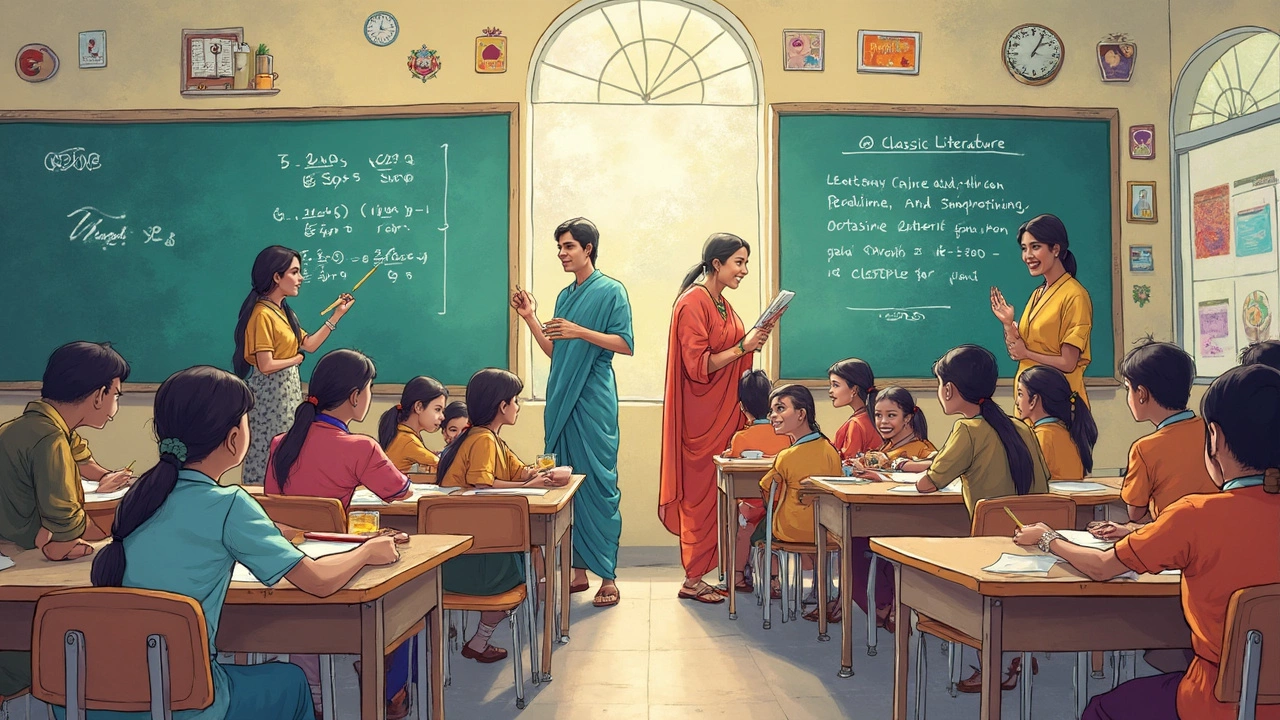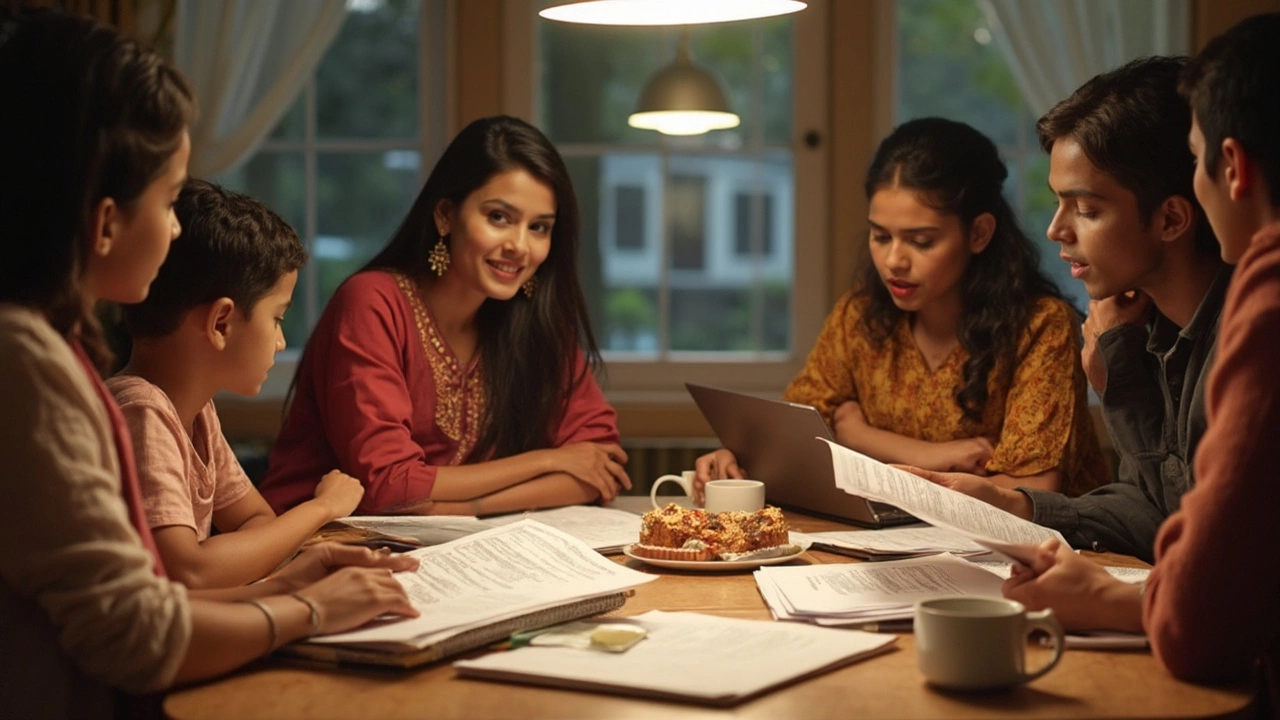Toughest Boards in India: CBSE vs ICSE and the Runner-Up Race
 Jun, 17 2025
Jun, 17 2025
Every year, lakhs of students bite their nails waiting for board results. The obvious question pops up at almost every dinner table: which school board is the toughest to crack in India? The answer isn’t as simple as just picking a name. But if we’re being real, two boards—CBSE and ICSE—bag the top spots when it comes to being tough. They have a reputation for high standards, tricky syllabus, and board exams that can keep anyone up at night.
The pressure is not just hype. While state boards have their fair share of stress, CBSE and ICSE pack in tougher subjects, a broader range of topics, and a vibe where scoring 90% isn’t as easy as it looks on TV. Ever wonder why some parents queue up for hours during admissions to these boards, despite all the panic? It often boils down to the idea that toughness builds a stronger foundation, especially if you dream of top colleges or acing competitive exams down the line.
If you’re stuck choosing between CBSE, ICSE, or any state board, getting the inside story helps. Instead of going by random internet opinions, let’s dig into what really makes CBSE and ICSE stand out, what students struggle with, and a couple of cool tips to survive and even enjoy the ride.
- Why Everyone Debates the Toughest Boards
- How CBSE and ICSE Stack Up
- Challenges Students Actually Face
- Tips to Handle the Pressure
- Making the Right Choice for You
Why Everyone Debates the Toughest Boards
The moment kids hit middle school, the talk about school boards takes over family group chats and lunch breaks. Parents stress about which board is going to push their child the right way, students swap stories about impossible papers, and teachers get bombarded with the “best board” question. But why does it matter so much?
One reason is that the toughest board in India is seen as a ladder to better colleges and a fancier career. Colleges often care more about your board marks than your personality, and many parents believe a tougher board means better preparation for competitive exams like JEE or NEET. The belief is simple: struggle now, shine later.
Another big reason? Reputation. ICSE and CBSE are known nationwide. These aren’t just regional boards with a fixed teaching style—they’re meant to set a high bar, and families moving across states or even abroad prefer them because universities tend to recognize their results.
There’s also a lot of confusion. Board syllabus changes, new exam patterns, and shifting rules keep people guessing. What was true ten years back isn’t guaranteed today. Every year, the “toughest” title bounces between CBSE and ICSE depending on which had horrible maths papers, tougher marking, or made headlines for unfair marking schemes. So, the argument keeps coming back, like clockwork, because outcomes and experiences really do vary.
Honestly, it boils down to what students want from their school years. Is it conceptual depth, a wide syllabus, easier scoring, or simply less stress? That’s why you’ll keep hearing this debate—no one wants to risk picking the wrong path in a system where board results shape so much of a student’s future.
How CBSE and ICSE Stack Up
If you set out to figure out which board—CBSE or ICSE—gives students a tougher time, it’s best to see how each one works up close. Both boards are popular in India, but they have pretty different approaches. Here’s how things shake out:
- CBSE stands for Central Board of Secondary Education. It’s recognized all over India and is the go-to board for kids who might have to change cities because transfers are common for government employees and defense families.
- ICSE is Indian Certificate of Secondary Education, run by the CISCE. It’s usually seen as more detailed with each syllabus, especially in English and science subjects.
Let’s break down the main differences in a way that actually matters for students:
| Feature | CBSE | ICSE |
|---|---|---|
| Subjects | Core focus—Maths, Science, Social Science, English, Hindi | Wider range—Arts, Technical Drawing, Environmental Science, and more languages |
| Exam Style | Objective questions, more MCQ in board exams | Descriptive answers, some creative and analytical questions |
| Recognition | Accepted at almost all Indian colleges and most abroad | Accepted in India, strong preference in UK/US for higher studies |
| Teaching Style | Textbook-based, streamlined, focused on national entrance exams | Application-based, needs in-depth study and lots of writing |
| Passing Marks | 33% | 35% |
| Syllabus Load | Lighter, but quick-paced revisions | More content and projects in every subject |
One hard truth: the ICSE board is famous for its challenging assignments, lengthy papers, and surprise twists in exam questions. But a lot of students find CBSE syllabus tough for a different reason—it’s built around fast learning, practice tests, and a lot of pressure to perform in competitive exams like JEE or NEET. So you’re often forced to cram a lot in short bursts.
Some say ICSE gives you an edge if you love exploring every nook and cranny of a subject. You end up writing more, thinking on your feet with tricky questions, and handling a higher load of internal projects. CBSE, on the other hand, rewards sharp recall, precise answers, and steady performance in test after test. It gears you for entrance exams straight from school. So, both are tough—just in their own way. If your goal is medicine or engineering in India, CBSE has the upper hand. For overseas studies or creative fields, ICSE might just be the better prep.

Challenges Students Actually Face
Ask anyone stuck prepping for board exams—they’ll tell you CBSE and ICSE aren’t just tough by reputation. There are real challenges students go through, and these aren’t just about memorizing a bunch of textbook lines. Let’s break down what really makes these boards tough, using real facts and numbers.
- Wide Syllabus Load: Both boards have a long list of topics for each subject. For example, in Science for Class 10, CBSE prescribes over 15 chapters, and ICSE has even more since it splits some subjects like Physics, Chemistry, and Biology.
- Conceptual Focus: ICSE goes deeper into concepts and asks students to write detailed answers. Many find the English language and literature paper especially demanding. CBSE is more straight-to-the-point in questions, but there’s a lot of application-based stuff. No scope for just mugging up.
- Practical Exams and Internal Assessments: ICSE requires lab work in the sciences from lower classes itself, and project submissions are stricter. CBSE now includes practicals, especially in higher classes, but ICSE often stays tougher with grading.
- Competition & Performance Pressure: Since lakhs of students appear for the CBSE board exam every year, even a single mark can make a big difference in cut-offs. ICSE students find the marking scheme strict—it's not rare to see a lower overall average compared to CBSE.
If we look at actual data, here’s a quick CBSE vs. ICSE snapshot for 2024 board results:
| Board | Pass Percentage | Unique Challenge |
|---|---|---|
| CBSE | 87.98% | Huge competition for top ranks, higher cut-offs for college admissions |
| ICSE | 99.47% | Lengthy papers, in-depth assessments, stricter evaluation |
Fun fact: ICSE papers are often said to be lengthier, with students struggling to finish on time. There’s less scope for one-word answers; ICSE expects you to explain stuff—even in Maths or Science! CBSE students, meanwhile, face a different headache: brutal competition. Since CBSE gets more attention in national exams like JEE and NEET, everyone’s racing for top spots, which pushes the stress levels higher.
At the end of the day, sticking with either board means a real test of endurance, planning, and smart study methods. The toughest board in India title isn’t just about what’s in the books—it’s about the pressure points outside them, too.
Tips to Handle the Pressure
Studying under the toughest board in India isn’t a walk in the park, but there’s a way to deal with the stress without losing your mind. Everyone feels the pressure, especially when the syllabus seems to grow faster than your to-do list. Here are some tried-and-tested ways to keep things under control:
- Break the Syllabus Down: ICSE and CBSE cover a big range of topics, so don’t try to do it all at once. Divide subjects into small, easy bits. A daily plan with just 2-3 chapters a day works better than cramming at the last minute.
- Focus on NCERT and Official Textbooks: For CBSE especially, NCERT books are your best friend. Most of the board exam questions come from here. Don’t waste time drowning in side books before mastering these.
- Mock Papers Are Gold: Practicing past years’ papers and mock tests isn’t just about revision—it gets you familiar with the question patterns. A fact: CBSE and ICSE release sample question papers every year. Try to solve at least one paper every week once your basics are done.
- Ask, Don’t Guess: If you’re confused by a topic, ask your teacher or check trusted YouTube channels for quick explanations. Some boards, like ICSE, are known for asking tricky application-based questions—you can’t always rely on rote learning.
- Keep Breaks Real: Endless study without breaks just burns you out. The pomodoro technique (study for 25 minutes, break for 5) actually works for most people—try it out and tweak based on what suits you.
- Don’t Ignore Physical Health: A strong mind needs a healthy body. Stay active, even if it’s a quick walk after dinner. This helps keep your brain sharp and less stressed.
Sticking to your routine beats last-minute stress. If you feel too pressured, talk it out with family or friends—the boards are a phase, not a life sentence. The real challenge is staying consistent, not being perfect. You’ve got this.

Making the Right Choice for You
When it comes down to picking the right board, the answer isn’t the same for everyone. Both CBSE and ICSE push students, but their focus and teaching styles are different. The CBSE board is super popular across India, and its syllabus lines up closely with major competitive exams like JEE and NEET. So, if you’re dreaming of a career in medicine, engineering, or government jobs, this can make your life a bit easier in the long run. Plus, if your parents move around a lot for work, CBSE schools are almost everywhere, which means fewer hiccups if you have to switch schools.
On the flip side, ICSE puts a lot of emphasis on English and a wider range of subjects, especially in the earlier classes. If you like subjects like literature or want a strong grip on language and creative writing, ICSE can give you a real edge. Many people see ICSE as having a tougher grading system, but a lot of universities recognize ICSE students for their balanced subject knowledge and strong communication skills.
Before making a choice, ask these questions:
- What’s your long-term goal—crack a big exam, or explore diverse subjects?
- Does your family move often? Consistency in a single board helps.
- Are you more comfortable with fact-based learning (CBSE) or in-depth project and writing work (ICSE)?
- How comfortable are you in English? ICSE’s language standard is higher even in subjects like science and math.
The other factor many ignore is teaching quality in the actual school. A great teacher can make a tough syllabus manageable, no matter the board. Talk to students, check school reviews, and even peek at textbooks if you get a chance.
If you want a smoother path for toughest board in India exams like JEE or NEET, CBSE gives a head start. If you value well-rounded development and language skills, ICSE feels more up your alley. Either way, the right choice is about what works for your strengths and future plans, not just chasing a board because of its reputation.